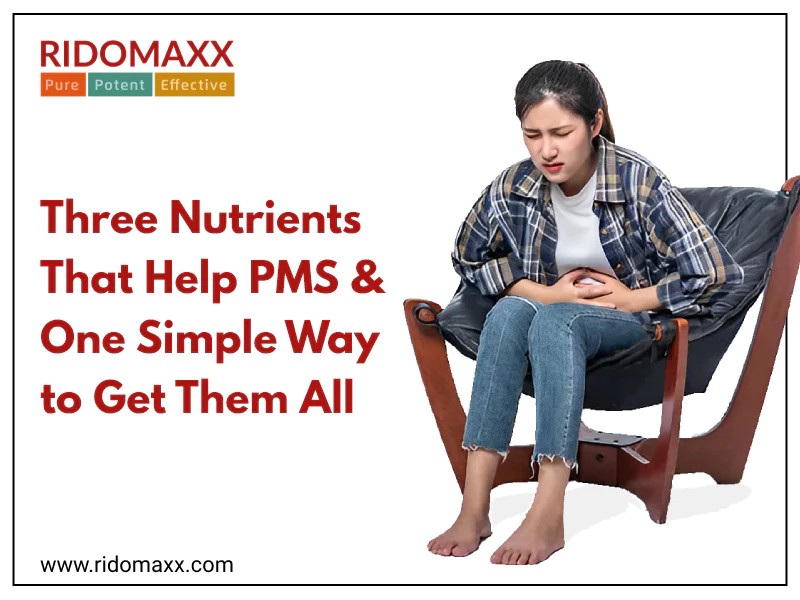
Nine out of every ten women suffer from premenstrual syndrome symptoms in their childbearing years. Bloating, cramps, headaches, mood swings, breast tenderness, insomnia, irritability, anxiety, headaches and digestive issues – the PMS symptoms may vary for every case but they never miss a chance to make their presence felt.
Premenstrual Syndrome Symptoms – Every Month’s Ordeal
Anxiety, craving, depression, hydration, and miscellaneous physiological problems- symptoms of PMS have broadly divided into five categories. Every month a woman suffers a risk of experiencing any or all of the symptoms across these five categories in one form or the other. In a few cases, the symptoms may aggravate to the point they interfere with the normal functioning of life.
Painkillers/OTC medications, heat packs/hot baths, massaging with essential oils, and limiting certain foods are some of the common tips given to reduce period pain.
But all these remedies are only quick temporary fixes. Are there permanent fixes that can address the primary cause of Premenstrual Syndrome to reduce the symptoms and cut down their chances of happening altogether? The ongoing research on Premenstrual Syndrome may have the answer to the question.
Nutritional Deficiency & Premenstrual Syndrome Symptoms:
The relationship between nutritional deficiency and PMS symptoms has always been straightforward. This is the reason why foods that relieve period cramps are predominately the sources of vitamins, minerals and nutrients. But not all “healthy foods” relieve PMS symptoms.
Healthy foods that reduce period pain or PMS symptoms tend to have 3 common nutrients that play a key role. And a recent study conducted on women in the age group 20-25 (higher risk of PMS) also seems to agree with the positive effect of these three key nutrients.
Research on Premenstrual Syndrome – Three Nutrients That Reduce PMS Symptoms:
Mounting on top of growing evidence, this recent study that aimed to find relationships between the risk of PMS and Vitamin D, Calcium, & Magnesium Status among university students came up with surprising results.
According to this study, both the dietary intake and serum levels of Calcium, Vitamin D & Magnesium in PMS cases were lower than their healthy counterparts. The research concludes by recommending the intake of foods with good sources of Calcium, Magnesium, Vitamin D & Potassium in order to reduce the risk of Premenstrual Syndrome.
So how to include Calcium, Magnesium & Vitamin D in the diet to reduce PMS symptoms?
A well-balanced diet with natural foods is always the best bet to fill the nutritional gaps. So here are a few natural sources of each of these nutrients that you can include in your diet to alleviate PMS:
Food rich in Magnesium: Pumpkin seeds, almonds, cooked spinach, dark chocolate, peanut butter, potato, oatmeal, yoghurt, banana, beans, milk apple and carrot.
Foods rich in Calcium: Milk, cheese and other dairy foods, green leafy vegetables, bread and bony fish.
Foods rich in Vitamin D: Salmon fish, tuna fish, sardines, cheese, egg yolk, pork, oysters, mushrooms, fortified milk, eggs and more.
While a well-balanced natural diet is the best way to get all the required nutrients, it does pose two problems:
- Nutrition available in common foods like milk, bread, poultry, green leafy vegetables and fish may not be sufficient when consumed in normal quantities. Take Magnesium for example. On average a woman has to consume 200 grams of meat, 300 grams of bread, 250 ml of milk and 200 grams of spinach to just fill the daily requirement of Magnesium that helps with PMS symptoms.
- Foods that are higher amounts of nutrition per weight are difficult to source and include in the diet. For example, 150 grams of Pumpkin seeds provide 100% RDI of Magnesium but they also contribute 30 grams of fat which on average is more than the total fat we consume in the day from all the foods combined.
Of all the three nutrients above, Calcium is relatively easy to source through diet. Magnesium and Vitamin D are difficult to source without spending considerable time, effort and even money.
But when you need all three nutrients in one go, it may not be practical to rely just on a natural diet to fill the nutrition gaps and reduce the risk of PMS symptoms. And this is when multivitamin supplements like Ridomaxx can help.
Ridomaxx Multivitamin Supplementation – One Simple Way to Get Them All
Ridomaxx is a comprehensive multivitamin supplement that is loaded with 23+ vitamins and minerals to reduce the risk of health conditions triggered by nutritional deficiencies. Take PMS for example. Our Ridomaxx Woman comprises perfect amounts of Calcium, Magnesium & Vitamin D that perfectly fills the daily requirements of woman to reduce the risk of PMS.
We still recommend a diet of well-balanced foods to reduce PMS symptoms. But if you are repeatedly falling short in this endeavor, Ridomaxx is the best multivitamin supplement for PMS that can power up your diet to reduce PMS symptoms.
Our superior nutritional blend perfectly hits the right combination of vitamins and minerals for all common problems caused by a lack of the right nutrition. In Ridomaxx Men and Ridomaxx Woman, we offer customized multivitamin supplements that cater to the specific nutritional requirements of each gender. Find more information on our multivitamin supplements here: https://ridomaxx.com/
References:
https://jamanetwork.com/journals/jamainternalmedicine/fullarticle/486599




